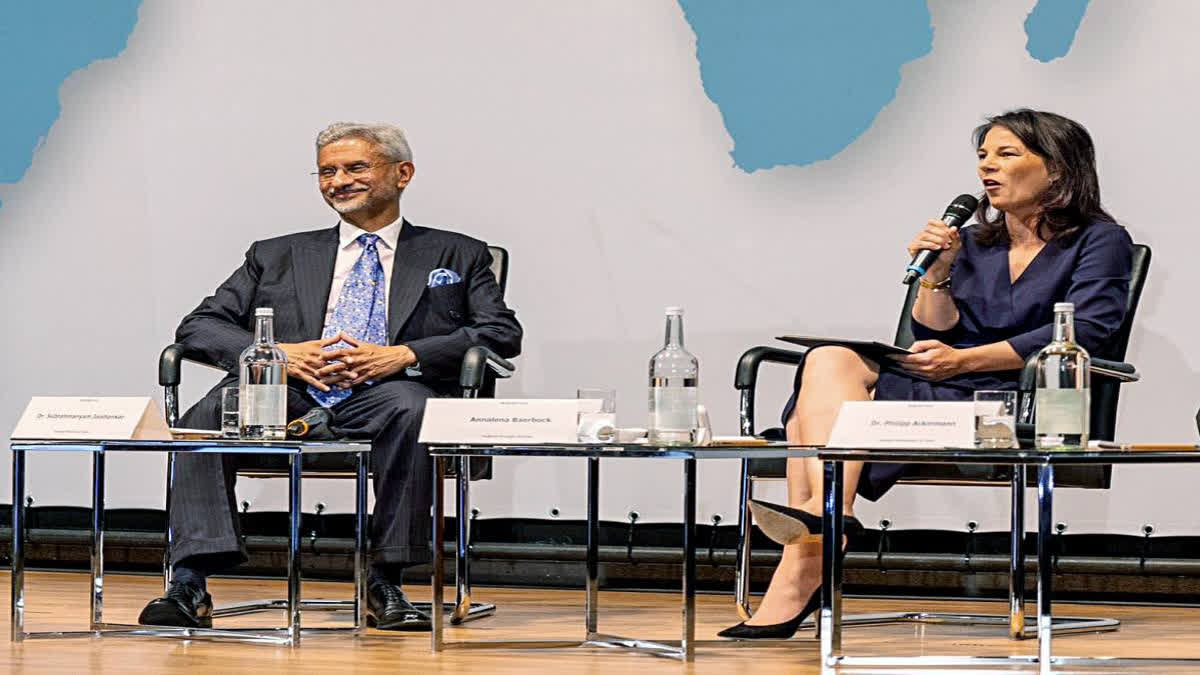New Delhi: Addressing the Annual Ambassadors’ Conference of the German Foreign Office in Berlin on Tuesday, External Affairs Minister S Jaishankar called upon Germany to relax its defence equipment export controls for India.
"Defence cooperation must be given greater thought, especially as the Indian private sector expands in that domain," Jaishnakar said.
"It will require export controls updating as well. We welcome the recent air exercises between India and Germany and await the impending ship visits to Goa."
Later, jointly addressing a media briefing with German Foreign Minister Annalena Baerbock, Jaishankar said that interactions in defence and security between India and Germany have also increased.
"And we would like to explore how our defence industries can cooperate more closely," he said.
Where does India-Germany cooperation stand as far as defence is concerned?
The defence cooperation between India and Germany dates back several decades, but it has gained significant momentum in recent years. Diplomatic relations were established in 1951, and both countries have since engaged in various defence dialogues and cooperative initiatives. The end of the Cold War and the rise of new security challenges prompted India and Germany to recalibrate their defence relationship.
India and Germany signed the Bilateral Defence Cooperation Agreement in September 2006. The Agreement on Mutual Protection of Classified Information signed in October 2007 provides the framework for bilateral defence ties.
To further enhance the defence industry and defence cooperation between Germany and India, the Arrangement on Implementation of the Agreement of 2006 concerning Bilateral Defence Cooperation was signed in February 2019 in Berlin.
High-level strategic dialogues between the defence ministries of both nations are held regularly to discuss global security challenges and bilateral cooperation.
In June last year, Defence Minister Rajnath Singh held a bilateral meeting with German Federal Minister of Defence Boris Pistorius in New Delhi. Both Ministers reviewed the ongoing bilateral defence cooperation activities and explored ways to enhance the collaboration, particularly defence industrial partnership.
Singh highlighted the opportunities that have opened up in the defence production sector, including the possibilities for German investments in the two defence industrial corridors in Uttar Pradesh and Tamil Nadu. The Indian defence industry could participate in the supply chains of the German defence industry and add value to the ecosystem, besides contributing to supply chain resilience.
Singh stressed that India and Germany could build a more symbiotic relationship based on shared goals and complementarity of strength, namely skilled workforce and competitive costs from India and high technologies and investment from Germany.
India and Germany have Strategic Partnership since 2000, which is being strengthened through inter-governmental consultations since 2011 at the level of heads of government.
Both India and Germany have engaged in joint training exercises, though these have been limited compared to other partnerships. However, the potential for future combined exercises, particularly naval and air force drills, is a focus area. Indian officers regularly participate in training courses and military exchange programmes in Germany, benefiting from Germany’s advanced military education and training infrastructure.
One of the most notable areas of defence collaboration is submarine technology. Germany’s ThyssenKrupp Marine Systems (TKMS) has been involved in providing critical technology for India's submarine fleet, including the HDW Class submarines.
Germany has been keen on participating in India's 'Make in India' initiative, particularly in defence manufacturing. This includes potential collaborations on joint production and technology transfers in areas such as naval systems, advanced materials, and defence electronics.
However, the defence collaboration between the two countries often faces delays due to bureaucratic processes, differing procurement standards, and regulatory frameworks in both countries. Germany’s stringent export control policies pose challenges in the seamless transfer of defence technology to India.
Why does Germany exercise defence equipment export controls?
Germany’s defence equipment export controls are among the most stringent in the world, reflecting the country's historical context, legal frameworks, and commitment to ethical standards in international arms sales. These controls are designed to ensure that German-made defence equipment is used responsibly and does not contribute to conflicts, human rights abuses, or regional instability.
Germany’s stringent export controls are deeply rooted in its historical experiences, particularly its role in the World Wars and the devastation that followed. After World War II, Germany adopted a pacifist stance, which significantly shaped its approach to defence policies and arms exports.
Article 26 of the German Basic Law restricts the manufacture, transportation, and trade of weapons intended for war. This constitutional provision emphasises Germany’s commitment to peace and security.
The War Weapons Control Act regulates the manufacture, export, and sale of war weapons. It requires all arms exports to be authorised by the government, ensuring they are consistent with Germany’s foreign and security policy.
So, will Germany relax its defence equipment export controls for India?
Earlier this year, Germany’s Deputy Foreign Minister Tobias Lindner announced his government’s intention to reform its export control rules with the aim of streamlining the process for India to purchase weapons from German companies.
According to a report in Defence.in website, recent frustrations in Indian procurement programmes involving German components have underscored the need for reform. The Indian Light Tank Project, for instance, has been significantly delayed due to complications in securing German-made MTU powerpack engines.
"These setbacks have driven India to seek alternatives, as evidenced by the decision to turn to American Cummins engines," a posting on the website states. "Similarly, the unavailability of specialized MB 838 Ka-501 engines for India’s Arjun Mk1A tanks highlights another hurdle created by rigid export limitations."
The website further states that Germany’s desire to bolster its partnership with India is the core of this change in defence equipment export policy.
"Recognising India as a crucial strategic actor in the Indo-Pacific, Germany intends to solidify cooperation and elevate India’s status as a key defence partner," it states.
It is in light of all this that Jaishankar's call to Germany for "export controls updating" assumes significance.



